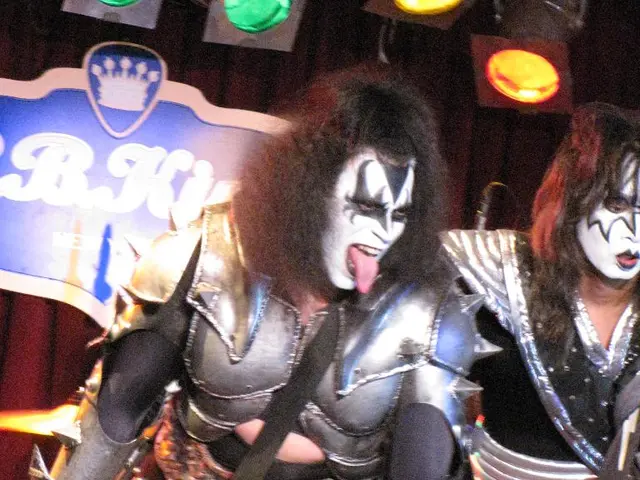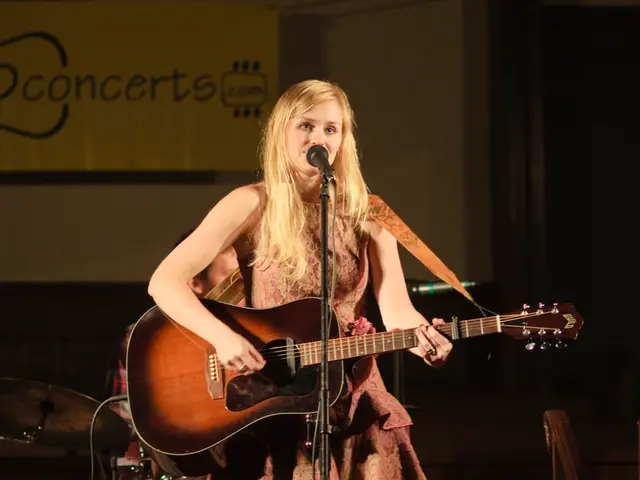Island Vibes: Gerster and Riley Chat About "Islands"
"Fuerteventura's project was an added perk"
Skype Session with ntv.de
Jan-Ole Gerster, the mastermind behind "Oh Boy" (2012) and "Lara" (2019), takes you on another captivating cinematic adventure with "Islands". This time, Sam Riley, a brooding leading man, stars as a weary tennis coach ensnared in a web of strange happenings on a sun-soaked island paradise, Fuerteventura. The film is earning three Lola nominations at the German Film Awards.
Over some lively discussions with ntv.de, Gerster and Riley gave some intriguing insights into the shooting on the Canary Island, the fate of the central character, and the enchanting Dascha Dauenhauer soundtrack.
ntv.de: Sam, were you familiar with the Canary Islands before shooting "Islands"?
Sam Riley: My grandparents wanted to live out their golden years on Tenerife, and I visited them when I was twelve. That was the only time I'd ever been on a Canary Island. I adored the filming location there - it was an exquisite work environment. I fancy tropical weather, but I wasn't accustomed to it. I spent most of my vacations in England, mostly an hour and a half away from the coast in Yorkshire. We never ventured beyond Yorkshire for our holidays, so I highly valued locations where you could take a dip in the sea. However, after eight weeks of sunshine, I started to feel the character's fatigue that came with working in that hotel. The first three weeks, we filmed in a hotel where tourists were vacationing - that was insane. Eventually, I looked forward to putting on a thick winter coat, wrapping a scarf around my neck, and strolling around the Schlachtensee with a brisk winter wind.
Jan-Ole, you came up with the concept for "Islands" while lounging on Fuerteventura. How did that come about?
Jan-Ole Gerster: I'm very sensitive to locations, and sometimes I fall in love with places that I believe would make fantastic film settings. Fuerteventura was a mix of beauty and quirks - it seemed perfect for a film. If you seek out the right spots, it feels magical. The touristy aspects, however, were dated. I quickly developed the idea of a tennis instructor after witnessing a man play tennis relentlessly in a rusty court during the blistering heat. He commented on every point with the same monotone voice, which resonated with me and seemed emblematic of his monotonous life in the purported paradise.
Did you interact with him outside of your observation?
Gerster: I chatted with him briefly about the essence of his life and how he felt about working on the island. He didn't appear to be content with his existence, even though he said he loved it and never regretted a single day. I found this statement intriguing, as he seemed lonely and socially isolated.
Sam, what drew you to the role when the offer came your way?
Riley: The opportunity to work in Fuerteventura was a bonus, but what truly interested me was the script, the narrative, and the character. I breezed through the script in one sitting, ironically while sunbathing on the beach. I knew instantly I had to be a part of it. Any actor of my age would be thrilled to have this role. It's a complex character, a blend of contrasts. And he's in every scene - that's a dream for an actor.
In reality, you're similar to Dave, the character you play's wife, rather than Tom. True or false?
Riley: In terms of having a loving family, yes.However, I believe Tom and Dave share similarities - they're both grappling with their happiness in life. It's easy to envy others' circumstances, whether you have money or no money, a partner, or not. It's like this hippie wisdom that's true: it all comes down to your mindset. Lately, I've adopted the mindset of focusing on one day at a time, making things simpler.
Have you ever experienced the thought that the grass is greener on the other side?
Riley: I think many adults have contemplated life at some point and wondered if that's it, or what am I doing here? It doesn't matter whether the person has wealth or not. I've been fortunate to avoid these moments for now.But today, perhaps tomorrow?
Not today, maybe tomorrow?
Riley: Yes, but I've learned to approach it differently. A few years ago, I began focusing on daily life rather than worrying about the future or past.
As an actor, you must envy your co-stars' roles from time to time.
Riley: Yes, all the time! I revel in my colleagues' successes but secretly grieve over the roles I didn't get. That's why I usually stick to watching reality TV - it's less painful when they aren't incredible actors.
How did you and Jan come together for this project?
Gerster: I had long admired Sam's work, particularly his remarkable performance as Ian Curtis in "Control". I was thrilled when I discovered he resided in Berlin, and we found ourselves with the same agent. We eventually arranged a meeting, and it was apparent that we'd make an excellent collaborative team.
But Jan didn't immediately cast you, right?
Riley: No, he didn't cast me right away. He had a three-day rule but didn't spend the days consecutively. I met him once a week and on separate occasions. On our first meeting, we didn't discuss the film so as not to come across as too eager. On the second meeting, I expressed my interest in the role. On the third meeting, we played tennis together.
Really? Who was the better player?
Riley: Jan's much better than me. He's an accomplished tennis player, which catching up on the game's history intrigued him. I had never played tennis before.
Have you refined your tennis skills since then?
Riley: I've improved slightly, thanks to the lessons I received during the production. The production company generously paid for my lessons, which was nice since I was teaching children to play tennis in the film. My son sometimes joined me for practice, and I used the time to learn how he was taught. My son still plays tennis. He takes after me and is quite skilled.
The film carries a noir crime feel, even though it isn't one, with a multifaceted character like Tom...
Gerster: The depth of the character and our empathy for him are thanks to Sam's outstanding acting. When we initially pitched the film to potential investors, many only saw a one-dimensional tennis instructor cliché. However, it was important to me that it was a character who reconnects with his emotional life and learns something about himself - about what is missing in his life. It's a testament to Sam's talent that the character carries emotional weight without ever explicitly expressing it.
The film is primarily in English, with a smattering of German and Spanish…
Gerster: I've been watching films in their original languages since I first started watching movies, particularly those in English. I desired to expand my artistic range and wanted to create something in English. Additionally, it has to do with the reach of films. It's become increasingly difficult to market German cinema to a German audience. The films must take a radically different path these days, and German-language cinema alone is no longer enough to guarantee success at the box office, as it was ten or twenty years ago. I would never force a German tale into English, but here it made sense because there are just as many inebriated British tourists stumbling around the island as Germans. It felt like the perfect film for my English-language debut, given that it offered neutral territory for everyone involved - the British, the German crew, and the mainland Spaniards. We were all guests on this island, and as a result, we became one.
How did you collaborate on the script and in what language did you write it?
Gerster: I began writing the script with Blaž, who also contributed to the screenplay for my previous film. He's Slovene, and I met him through a script lab. We struck up a friendship based on shared tastes. We communicate and write in a language we like to call "European English", a euphemism for the fact that we both aren't fluent in it, but can communicate effectively. When it was time to share the script with English actors, we brought in Lawrie, another acquaintance from the script lab. He polished the language and had valuable dramatic insights, making him the third author. However, the scenario never evolved into a sitting-down brainstorming session.
Gerster: The more time we spend with each other, the easier it becomes to work together. I made an effort to spend a lot of time with the actors prior to filming to answer any queries about the characters or the plot that didn't need to be addressed on set. Directing relies heavily on language precision - slip in a helpful sentence that helps the actor. I wouldn't say it worked perfectly, but I would estimate we were about 70-80%. Sometimes, it required five sentences when one would suffice. If you tally it all up, it accounts for an extra shooting day. But it surprised me how well it worked.
Music plays a crucial role in this film. How was the concept conceived?
Gerster: I enjoy listening to music while writing, and we also listened to music during the filming. The film has these signature zooms where I would stand with the cinematographer on the tripod, hit play on the music player, and find the groove of the movie. Music allows me to write more visually and not just focus on dialogue. In the editing room, we initially experimented with various musical arrangements - a mosaic of moods from film noir to Pedro Almodóvar. At that point, Dascha (Dauenhauer) entered the picture.
Don't you get apprehensive when a composer contributes the music?
Yes. But with Dascha, it was different. Her music knocked our socks off. We took the time to find the right music with her, talking it out like David Lynch and Angelo Badalamenti. I don't have the musical vocabulary to express myself, but she understood. I said, "It needs to be like tinnitus that blocks out all other sounds, with that uncomfortable darkness returning." The next day, she presented a piece that was exactly that. It was a fantastic and breathtaking experience.
Nicole Ankelmann is an editor for the entertainment department. In her free time, she loves rock music, from indie to metal, and appreciates both thought-provoking art house films and well-crafted blockbusters. Sam, you're a musician yourself – what was your reaction when you first saw the film with the completed soundtrack?
Riley: I watched the film in a theater for the first time with the music and was astounded by the music. Dascha outdid herself. The music perfectly complemented the style of the film. It's reminiscent of music you almost recognize, yet completely unique. That's so important. Too often, you watch a film premiere and feel, "Oh, what is that?" when the violin is heard throughout the film. But not this time.
Are you still making music on your own?
Riley: Yes, but I'm no longer working with the band. I focus on writing music for myself, recording tracks, and occasionally considering releasing something. I play guitar almost every day at home. I think about putting out something, but then I reconsider because it's my life's music now.
Interview held by Nicole Ankelmann
"Islands" is now showing in German cinemas.
- Sam Riley, in discussing his experience with the filming location for "Islands," mentioned that his grandparents had wanted to live on Tenerife in the Canary Islands, and he had visited when he was twelve years old.
- Jan-Ole Gerster, the director of "Islands," said that he came up with the idea for the film while lounging on Fuerteventura, another island in the Canary Islands, and was inspired by a man he saw playing tennis in a rusty court.
- Sam Riley, reflecting on the character he plays in "Islands," mentioned that the character and the script were what drew him to the role, and that he found it to be a complex character with a blend of contrasts.
- Jan-Ole Gerster, in discussing the collaboration on the "Islands" script, mentioned that he and his collaborators communicated and wrote in a language they called "European English," and that the script was mostly written in English.








